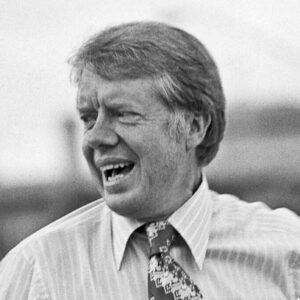The First in the Nation presidential primary has been around for more than a century, with hundreds of candidates campaigning for New Hampshire votes. But a handful of campaigns helped create the legend of the Granite State primary lingers today:
Incumbent President Lyndon Johnson dropping out of the race after an underwhelming performance;
Pat Buchanan’s stunning showing against President George H.W. Bush that led to the incumbent’s defeat;
Bill Clinton’s “Comeback Kid” 1992 campaign.
And perhaps most important of all, the 1976 victory of an unknown, one-term governor from the rural South over a field of his party’s heavyweights, powered by months of retail politics.
Jimmy Carter, who died Sunday at age 100, proved what New Hampshire politicos have long preached: that the small state with a history of town hall politics gave every candidate, regardless of their financial standing, a legitimate shot at winning.
Carter took that shot, and he wasn’t shy about it, recalls longtime political strategist Tom Rath.
“A long time ago, I was a young prosecutor in the state Attorney General’s Office,” Rath recalled. “I had a bare office with a desk and chair in the hallway between the elevator. I was working diligently away when a gentleman with freckles and reddish hair came up to my desk and asked if he could interrupt me and say hello.
“He told me his name was Jimmy Carter and he was running for president. He was soft spoken, friendly, and entirely forgettable. But he persevered and he served our country with character, decency, and honor.
“I am sad for his passing, but remember him with respect and gratitude,” Rath said Sunday night.
Iowa often gets the credit for vaulting Carter’s political career, but in fact the peanut farmer from Plains, Ga., came in second there — behind “uncommitted.” He still outperformed national figures like U.S. Sen. Birch Bayh of Indiana and Kennedy family spouse Sargent Shriver.
It was New Hampshire where Carter won his first victory, with 28.6 percent of the vote. Popular liberal U.S. Rep. Mo Udall (D-Ariz.), who would support Sen. Ted Kennedy’s 1980 challenge to Carter, came in second. Bayh finished third.
For many Republicans, Carter is a political punchline — the first elected president to lose his bid for a second term since Herbert Hoover during the Great Depression — and they note the nation’s many economic and foreign policy failures during his term
But Democrats still view him fondly.
“When Jimmy Carter first came to New Hampshire, he was known as ‘Jimmy Who?” said veteran Democratic strategist James Demers, a reference to Carter’s now-famous (infamous?) visit to Robie’s Country Store in Hooksett during the 1976 campaign.
According to the story, when fifth-generation owner Lloyd Robie was introduced to Carter, he replied ‘Jimmy who?”
Whether the story is real or apocryphal, it helped make the case that person-to-person politicking could sway enough New Hampshire voters to lift a candidate from obscurity to victory.
“He campaigned across the state the old fashioned way, going out and meeting voters face to face, making his case and ultimately winning the New Hampshire primary,” Demers said. “He showed his humble roots and folksy charm. Coming off of a dark time in American politics with the Watergate scandal and the resignation of President Richard Nixon, Jimmy Carter’s timing and message of honesty and decency resonated with voters all across the country.
“He was a rare individual, giving back and always looking out for the little guy, even after his term as president was over.”
U.S. Sen. Jeanne Shaheen traces her career in politics back to the 1976 Carter campaign.
“I’m devastated by the passing of my mentor and friend, Jimmy Carter, and join the nation in grieving the loss of this incredible leader,” Shaheen said in a statement. “He led this country with empathy, grace, and determination, and I owe my journey in politics to him. From working on his primary presidential campaign in New Hampshire in 1975, I became inspired by his compassion for people and vision to make this country a better place.
“The values he passionately advocated for inspired my run for office, and I’ve made it my mission in the Senate to take the mantle of fighting for working families and justice. We have lost a titan of American politics, but our country is better for his unwavering service. I join with all Granite Staters in keeping the Carter family in our thoughts. May he rest in peace.”





